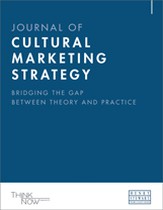Cultural sensitivity in consumer goods and marketing : A mixed methods exploration
Abstract
Cultural insensitivity (ie improper response to cultural traditions and styles) has increased with globalisation and intercultural contact. At the same time, little is understood about when and how cultural insensitivity might be perceived, especially within everyday contexts. To assess this, two cohorts of young adults (Cohort 1: n = 100, 69 per cent white, 59 per cent male; Cohort 2: n = 167, 65 per cent white, 48 per cent male) were presented with real-world images and situations that could be viewed as culturally insensitive. Cohort 2 participants were also asked about their opinions on companies changing their marketing strategies to address perceived cultural insensitivities. Quantitative and qualitative responses reflected a range of opinions. Our study suggests that young adults who perceived marketing changes to be appropriate were also more likely to perceive cultural insensitivities across scenarios, suggesting a general consciousness of cultural ideology. Women, also, identified all the given scenarios as more culturally insensitive than did men. This paper builds insight into how young adults respond to and reason about culturally relevant concerns, which has implications for contemporary rhetoric around positive and negative views of political correctness. Considering the global nature of cultural insensitivity, more widespread examinations of its processes, in other societies, is essential. Additionally, the need for increased awareness and critical cognisance of cultural sensitivity is vital to guide everyday interactions with others.
The full article is available to subscribers to the journal.
Author's Biography
Rebekah Lassiter holds a BS in biology from Wake Forest University. Her research explores the cultural, social and scientific implications of relationships and communication.
Lisa Kiang is a Professor at Wake Forest University. Her research examines ethnic-racial identity and social relationships, with an emphasis on positive wellbeing among minoritised adolescents.
Alycia Silman Alycia K. Silman is a staff member at Wake Forest University, where she provides research support for multiple human participant labs. Her recent work includes investigations of memory exposure and working memory in the Amazon. She holds a PhD in cognitive psychology from the University of North Carolina at Greensboro.
Katherine-Thu Yule (formerly Quinn) is a first-year counsellor trainee of the Diploma in Integrative Counseling and Psychotherapy with S.M.I.L.E. Counseling. As a Saltire Scholar, she earned a master of science in autism research and the Psychology Postgraduate Prize for Exceptional Performance from the University of Stirling. As a Gordon Scholar, she received a bachelor’s degree in psychology from Wake Forest University. Katherine is interested in multicultural identity and neurodiversity within psychotherapy.
Xiaotong (Eva) Wu is a Research Assistant and Lab Manager in the MIND Lab at Northeastern University. Her research focuses on the intersection of music and health, with a particular interest in the therapeutic applications of music to enhance wellbeing. She received her BA in Psychology and Music Performance from Wake Forest University in 2017, and her MA in the Social Sciences from the University of Chicago in 2022.
Yang Fan works as a Mental Health Clinician in the Boston area. She earned her BA in psychology and mathematics from Wake Forest University, and her MA in mental health counselling from Boston College.
Ashley Maxime received her undergraduate degree in psychology from Wake Forest University in 2020. She is currently working and pursuing graduate studies at the Wake Forest School of Medicine.
Madeline Alexanian is an incoming school psychology Doctoral Student at the University of Wisconsin-Madison with an emphasis on reading/writing assessment and bilingual assessment practice. During her time at Wake Forest, Madeline worked with Dr Lisa Kiang on research into cultural appropriation.
Marisa Busquets is a third-year doctorate student in Eastern Kentucky University’s Clinical Psychology PsyD programme. She received her bachelor’s degree in psychology from Wake Forest University and her master’s degree in clinical psychology from Eastern Kentucky University. She is interested in working with victims of sexual assault and relationship trauma, as well as individuals experiencing physical pain.
Zoe N. Stuckey Zoe Stuckey is a Therapist at Pasadena Villa Outpatient-Triad in Greensboro, North Carolina. She holds a master of science in counselling from the University of North Carolina at Greensboro and a bachelor of arts in psychology and theatre from Wake Forest University.
